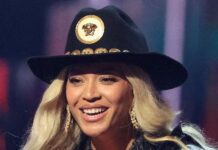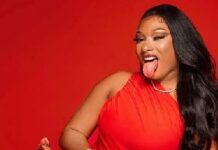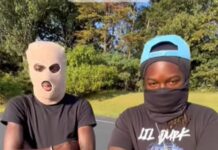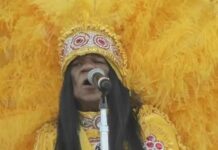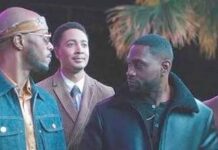
*RuPaul, the glamazonian drag performer who has made an international name and career for himself as “a living Barbie doll” has said that “we are all born naked; the rest is drag!”
When I first heard him say that, I understood it as I have seen many a person dress outside of their own character to create a new and different character, nay version of themselves, so that they didn’t feel old going into the club with 20-somethings or even people who spend loads on labels so that they could feel expensive, even at the expense of their bills and credit score.
But there is one place that the idea of clothes and presentation as “drag” and a full representation of self and that is among Black men.
In listening to and reviewing some of the post-Oscar commentary about “MOONLIGHT” as the Best Picture of the Year winner, I am stuck (and sometimes, I am stuck silent) by the number of Black men who have not only not seen it but say that they won’t because of the movie “playing into Hollywood’s propaganda to try to emasculate Black men!”
The verb “emasculate” means “to castrate, deprive of strength or vigor or to weaken.” It appears to me that Hollywood has bought into the opposite of emasculation, turning Black men into such hyper-masculine representations of “manhood” that the idea of us being able to cry or care about each other or ourselves is almost impossible. But Barry Jenkins and Tarell Alvin McCraney were outside of the Hollywood agenda when they decided to make an independent film about their lives, that both happened in the dank and sometimes dark streets of Liberty City in Miami, FL, but both included rough rides on drug-infested streets and stories of the mothers lost to those very streets.
Playwright McCraney wrote the story “In Moonlight Black Boys Look Blue” as a play and when he handed it to filmmaker Jenkins to adapt, their worlds collided because each of them discovered that, although they had lived blocks apart, they had never come together until their stories merged. But in version of their collective tale that made it to the movies and moved tears out of our deepest sockets, we discover that there was something indeed that made their character, the representative of little Black boys—mocked for being quiet and ridiculed for jeans that didn’t sag to the ground—that they created was a hyper-masculine, loud music-listening, grills-in-teeth-rocking, muscled mannered man who was so masculine that he scared drug-dealers that work for him and who was assumed to be the most masculine man on the block.
The perception is one that lives, breathes and breeds in the world of Black men in America. To ensure that we aren’t seen as the effeminate caricatured versions of Black gay men on reality TV, most Black gay men can out-masculine most men, with chiseled bodies and beautiful female best friends who help them, especially on social media and at family events, avoid the ridicule that comes to Black men if you don’t represent as unstoppable and strong. That’s why Moonlight has had such an impact on Black men across the spectrum of sexuality and societal approximation. The boys and men in Moonlight are dealing with so many other things in their lives that their sexuality is a simple, though part, singular part of their lives. And many brothers forget, or just haven’t seen the movie, so they don’t know, that Mahershala Ali character, the drug-dealer with a heart of gold and a father figure’s strength, is the male figure that Chiron, just like many young men in the hood, mimics because that’s the only man he knows with any sense of relationship.
Black men, with our posturing and profiling and mean-mugging and such, present to the world and to each other, that we are not soft, never scared, unbreakable and then we wonder why we are seen as so hard and perhaps even so harsh. The deprivation of strength that we suggest as Black men comes from Hollywood is also the stuff of Black men who won’t cry and why men don’t go to the doctor or therapist for health and wellness, but it is also the deeper stuff of procreating with many baby mommas and not staying around and helping to build, even though they grow, the Black family. The strength of character that is purest about Black men is that DESPITE the efforts of mainstream society to tell Black men that you are not needed in your own culture’s homes and you are not nurturing your sons and you are thugs, powerful Black men have built homes and families and communities even when doing that has cost them the same stigma that is suffered by Black gay men when they don’t represent well.
There was the story of a young man, a video that went viral, who took the house his father left him and tried to turn it into a community center and it was Black men, Black hyper-masculine, you-can-not-have-our-turf men, who beat him to a pulp because his efforts were seen as outside of the way that they thought the block should be. He is crying on-camera, heartbroken that his kind of man was not the kind masculine that could be right because he was trying to give back and apparently, according to them, Black men, Men with a capital M, down brothaz, dudes, niggahs (AH not ER), playaz, some version of what he was not, didn’t do that, so they beat him because they wanted to prove, just like the strong one on the prison block, that they could control him and therefore how he showed up…in his own community.
Have we programmed our men and the boys who are coming after them to not cry (a common Black idiom) and to not care because caring is soft and loving is soft? Is the conflict that many Black men have with “Moonlight,” The Best Motion Picture of 2016, written and directed by a straight Black man, starring an award-winning cast of many Black men, all of whom are straight, the fear that they will find compassion and love and affection among Black men in this film and the fear isn’t that they will have to let go of the hatred or disdain that they think they have for gay men in their own community or in their own families, but rather the greater fear is that they will bear witness to tenderness amongst Black men—nurturing friendships and supportive role models—and have to let go of the hyper-masculine drag, cover of protection, that keeps many of them safe in the streets and stereotypes of what it means to be a down, cool, strong, real Black man?

About the Author
Kevin E. Taylor is an author, TV producer and empowerment speaker who tours the country and is the senior pastor of Unity Fellowship Church NewArk in Newark, NJ. Taylor has written seven books and novels and his autobiography (NEVER TOO MUCH: this is my story of big words, big dreams and an audacious big life) chronicling his childhood in the projects, coming out as gay and as a person of faith and his conversations with icons like Tina Turner, Stevie Wonder and his personal friend and sister Natalie Cole, will be out this Spring. Taylor is a father and grandfather and can be reached through his website www.KEVINETAYLOR.com
We Publish News 24/7. Don’t Miss A Story. Click HERE to SUBSCRIBE to Our Newsletter Now!
